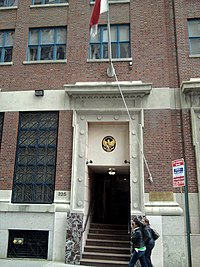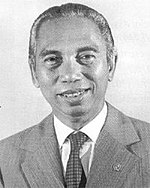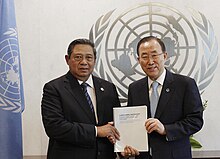  | |
| United Nations membership | |
|---|---|
| Represented by |
|
| Membership | Full member |
| Since | 28 September 1950 (1950-09-28) |
| UNSC seat | Non-permanent |
| Permanent Representative | Arrmanatha Christiawan Nasir |
Indonesia officially became the 60th member of the United Nations on 28 September 1950, in accordance with the United Nations Security Council Resolution 86 two days before, and the United Nations General Assembly resolution number A/RES/491 (V) on the "admission of the Republic of Indonesia to membership in the United Nations", less than one year after the independence of Indonesia's by the Netherlands at the Dutch–Indonesian Round Table Conference in the Hague (23 August – 2 November 1949).
Diplomatic representation
Main article: Permanent Representative of Indonesia to the United Nations
Indonesia has two permanent diplomatic missions to the UN in New York City and Geneva. These missions are headed by a Permanent Representative and an Ambassador. The Government of the Republic of Indonesia appointed Lambertus Nicodemus Palar as the first Permanent Representative to the United Nations. Palar had played a major role in efforts for the international recognition of the independence of Indonesia at the time of the conflict with the Netherlands in 1947, and had argued the case for the sovereignty of Indonesia in the UN as an Observer to the organization. Speaking at the UN General Assembly session in 1950, Ambassador Palar thanked all the supporters of Indonesia's sovereignty and pledged that his country would carry out its obligations as a member of the United Nations.
The responsibility of the Indonesian Mission is to represent the Indonesian interests in the UN including international security, disarmament, human rights, humanitarian affairs, environment, labor, international economic cooperation and development, international trade, South–South cooperation, technology transfer, intellectual property rights, telecommunications, health, and meteorology.
Withdrawal in 1965
Main article: CONEFODuring the Indonesia–Malaysia confrontation of 1965, and in response to the election of Malaysia as a non-permanent member of the United Nations Security Council, Indonesia decided to withdraw from the UN. Indonesia did not withdraw from the UN but informed Secretary-General U Thant that it would suspend its participation. Indonesian president, Sukarno, then created a rival to UN named CONEFO. However, in a telegram dated 19 September 1966, after General Suharto de facto assumed effective control of the Government, Indonesia notified the Secretary-General of its decision "to resume full cooperation with the United Nations and to resume participation in its activities starting with the twenty-first session of the General Assembly". On 28 September 1966, the UN General Assembly took note of the decision of the Government of Indonesia and the UNGA President invited the representatives of Indonesia to take their seats in the Assembly.
Activities
UN General Assembly


Indonesia became a member of the UN General Assembly in 1951. Indonesia was once elected to serve as President of the UN General Assembly in 1971, and was represented by Adam Malik, presiding over the 26th Session of the UN General Assembly. He was the second representative from Asia to chair the world assembly, after Dr. Carlos Pena Romulo from the Philippines.
UN Security Council
Indonesia has been elected four times as non-permanent member to the UN Security Council. Indonesia was first elected as for the period of 1974–75. It was elected for the second time in 1995–96 and for the third time in 2007–08, when Indonesia was elected with 158 votes out of the then 192 member states who have the right to vote in the UN General Assembly. In June 2018, Indonesia was elected with 144 votes out of 192 member states during the 72nd session of the United Nations General Assembly.
UN Economic and Social Council
Indonesia served as a member of ECOSOC for the periods of 1956–58, 1969–71, 1974–75, 1979–81, 1984–86, 1989–91, 1994–96, 1999–2001, 2004–06, 2007–09 and 2012–14. Indonesia elected twice and held the position as President of ECOSOC in 1970 and 2000, and was elected to the Vice-Presidency of ECOSOC in 1969, 1999 and 2012. During the 2012–14 term, Indonesia was selected for membership of ECOSOC, winning the greatest support of any Asian country in the election by secret ballot that took place during UN General Assembly plenary session of October 24, 2011, in New York.
UN Human Rights Council
Indonesia has been elected three times as a member of the UN Human Rights Council since the council was formed in 2006. Indonesia served as a member during the periods of 2006–07, 2007–10 and 2011–14. Indonesia once served as vice-president of the UN Human Rights Council for the period of 2009–10, represented by Ambassador Dian Triansyah Djani.
See also
References
- United Nations General Assembly (1950). "A/RES/491 (V)" (PDF). World Legal Information Institute. Retrieved 2 June 2012.
{{cite web}}: CS1 maint: numeric names: authors list (link) - Ministry of Foreign Affairs Republic of Indonesia. "Mission". Archived from the original on 4 June 2012. Retrieved 2 June 2012.
- Permanent Mission of the Republic of Indonesia in Geneva. "About the Permanent Mission". Retrieved 2 June 2012.
- Gutierrez, Natashya (2016-08-22). "What happened when Indonesia 'withdrew' from the United Nations". Rappler. Archived from the original on 2016-11-01. Retrieved 2018-09-08.
- Permanent Mission of the Republic of Indonesia in New York. "Compilation of Indonesia Statements in UN General Assembly" (PDF). Archived from the original (PDF) on 26 June 2011. Retrieved 2 June 2012.
- ___ (11 Juni 2009). "H. Adam Malik Batubara (1917-1984) Si Kancil Pengubah Sejarah". Tokoh Indonesia. Archived from the original on 2012-04-18. Retrieved 2 June 2012.
{{cite web}}: CS1 maint: numeric names: authors list (link) - Ministry of Foreign Affairs Republic of Indonesia. "Perserikatan Bangsa Bangsa". Archived from the original on 15 November 2012. Retrieved 2 June 2012.
- Hisar Sitanggang (25 October 2011). "Indonesia Terpilih Sebagai Anggota ECOSOC PBB". ANTARA News Lampung. Retrieved 2 June 2012.
{{cite web}}: CS1 maint: numeric names: authors list (link) - ___ (26 October 2011). "Indonesia Terpilih lagi di Keanggotaan ECOSOC PBB". ANTARA News Lampung. Retrieved 2 June 2012.
{{cite web}}: CS1 maint: numeric names: authors list (link) - B. Kunto Wibisono (21 Mei 2011). "Indonesia Terpilih Kembali Sebagai Anggota Dewan HAM PBB". ANTARA News. Retrieved 2 June 2012.
{{cite web}}: CS1 maint: numeric names: authors list (link)
External links
- Mission of the Republic of Indonesia to United Nations (New York)
- Permanent Mission of the Republic of Indonesia To the United Nations, WTO and Other International Organizations (Geneva)
| Relations of the United Nations with its member states | |
|---|---|
| Africa | |
| Americas | |
| Asia | |
| Europe | |
| Oceania | |
| Former members | |
|  | |||||||||||||||||
| ||||||||||||||||||
| ||||||||||||||||||